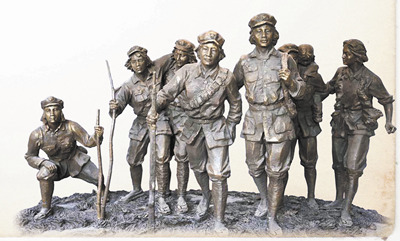
Female Soldiers in the Long March, a group of sculptures in the National Museum of Women and Children. (Photo/81.cn)
The Long March is known as an expedition of untold hardship and sacrifice. But female soldiers also braved its dangers.
When the 86,000-strong Central Red Army decided to make the strategic shift from Jiangxi province in 1934, only the 32 strongest women were selected to go along with the troops.
They were tasked with spreading the ideas of the Communist Party of China, taking care of the injured and raising supplies and money for the army.
Liu Ying was one of the female soldiers. She said when the troops set out, all she had was a blanket, a few clothes and food for around ten days.
She said that during the expedition, the soldiers were often exposed to the elements. On a rainy day, they were drenched, and in places where water was scarce, they were covered with dust.
At night, they slept on the wet and cold ground huddling together. Sometimes, they were so tired that they could sleep standing up.
The harsh natural conditions and scarce materials meant these young women had to shed certain feminine characteristics. They could not have long hair to avoid being identified by enemies. Hygiene was also such a big problem that some women found lice on their head. In order to avoid this, some simply shaved all their hair off.
This led to misunderstandings: when the army passed some areas, locals would ask the female soldiers to take off their clothes to identify their gender.
Moreover, the women had to overcome the pain that came during their menstrual periods. As the troops had to keep moving and battled along their way, the women had to forge ahead despite the pain.
Food was also a huge problem in the Long March. Bark, grassroots, and even leather shoes were consumed, and the female soldiers had tasted almost everything they could put into their mouth, driven by hunger.
One of the female soldiers Wang Ronghua recalled, "When the deep autumn fell, we only wore thin clothes to withstand the cold wind with our feet steeped in chilly and stinky water in the endless expanse of marsh.
"The only bag of highland barley and the salt we had were all finished. We had to eat wild herbs. When the herbs were eaten up, we found some cowhide and burnt the hair and boiled them to eat."


















































